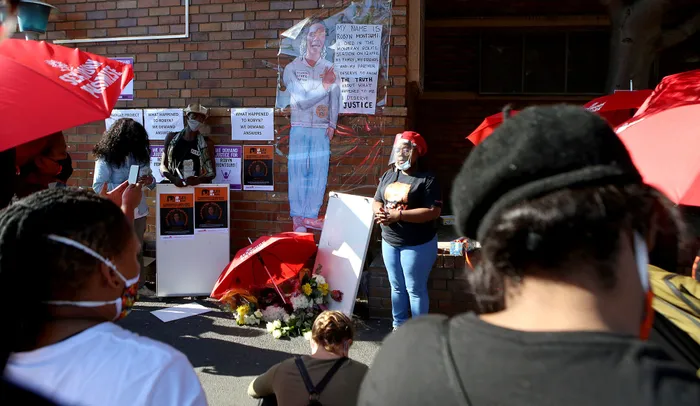Activists seek justice for Robyn

South Africa - Cape Town - 19 June 2020 - Memorial held at the Mowbray Police station for Elma Robyn Montsumi,a 39-year-old sex worker who died in police custody in April 2020. Picture: Brendan Magaar/African News Agency(ANA) South Africa - Cape Town - 19 June 2020 - Memorial held at the Mowbray Police station for Elma Robyn Montsumi,a 39-year-old sex worker who died in police custody in April 2020. Picture: Brendan Magaar/African News Agency(ANA)
CAPE TOWN - The scourge of gender-based violence is just one factor that has South Africa ranked amongst the least peaceful countries in the world.
President Cyril Ramaphosa said 21 women and children were murdered in the past two weeks alone. The recently released Global Peace Index (GPI), ranked SA at 123 out of 163 countries for state of peace within the country, thanks to the high violent crime and homicide rate.
The most peaceful country is Iceland, followed by New Zealand, Portugal, Austria and Denmark. The countries with the lowest-ranked GPI include Yemen, South Sudan, Iraq, Syria and lastly Afghanistan. As activists around the world turn their attention to police brutality and gender-based violence, South Africans mourned the senseless murders of more women and children during the lockdown.
Yesterday, activists and sex workers gathered outside the Mowbray Police Station to demand answers and justice for their friend, Robyn Montsumi, who was found dead in a police cell there on Easter Sunday. Police said she had hanged herself with a blanket, but activists believe she died due to police brutality.
Duduzile Dlamini, advocacy manager at the Sex Workers Education and Advocacy Taskforce (Sweat), said sex workers continue to be targets of violence, with one statistic suggesting they are 18 times more likely to be killed.
“We've got lots of sex workers that we've lost during this month. Those cases are still there. The perpetrators are still out there. There is no case going to court.”
Dlamini said Montsumi would have demanded fair treatment while in police custody. “I don't sleep at night thinking about what happened to Robyn in the cells,” she said.
“As an activist, she would fight for her rights inside, there no matter what. I wonder what happened to Robyn when she asked for her human rights. I promise, Robyn, we will always fight for justice for sex workers.”
Shadé Johnson had known Montsumi for years.
They would stay over
at each others’ houses, hang out and
smoke together. Johnson said she
believed that after days in a police cell
withdrawing from drugs, Montsumi
would not have had the strength to
hang herself.
“I’m a heroin addict like she was.
I’ve been in the cells,” she said.
“You throw up, you can’t walk,
it’s painful. For her to do that, no.
You’re too weak. She would rather lay
and scream and moan, and they got
annoyed about that.”
Fellow sex worker Lorna Hendricks
said Montsumi was an upbeat person who liked to help and encourage
people.
“We need justice because we don’t
know what she really died of,” Hendricks said. “She didn’t deserve to die
like this. There must be justice, because
me as a sex worker, I can also die like
that.”
She said fear of the police followed
her throughout her work.
“They know our families don’t care
about us. We’re on the streets, we’re
homeless. That’s why they think they
can get away with anything, and it’s
very wrong. As a sex worker, it’s hurtful,” said Hendricks.
Montsumi’s case has been referred
to the Human Rights Commission and
the Commission for Gender Equality.
The preliminary report by the Independent Police Investigative Directorate said nobody had been found
responsible.
“No one has been arrested as a
result of this incident as no one has
been found responsible,” said spokesperson Ndileka Cola.
“There is no discrepancy/foul play
that has been found during the preliminary investigation, also the pathology
report didn’t show any malpractice
from the police services.”
Meanwhile, the lockdown appears
to have caused a large reduction in serious violent crime when compared to
March to April last year, according to
founder of the Institute for Economics
and Peace, Steve Killelea. “There has
been an increase in domestic violence
during the lockdown. South Africa will
still face significant issues with regards
to violent crime after lockdown ends,”
said Killelea.
“Serious violent crime seems to be
down compared to the same period
last year. Reports of domestic violence
have increased.”